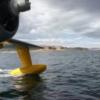Because you haven't yet actually had a venous thrombus event (to your knowledge), you're in a much better category if you indeed do have this deficiency. The deficiency alone is just a risk factor for Thrombophilia, but it's probably enough to require a waiver. Read these MSD excerpts of "disqualifying" conditions:
Remember "disqualifying" doesn't mean the Air Force will throw you out the door as soon as it's discovered. It just means a waiver and further consideration is necessary. Though the title isn't totally accurate, the Waiver Guide entry for "Deep Venous Thrombosis/Pulmonary Embolism" is most applicable to you. Whether you will require anticoagulant therapy will be the deciding factor in your waiver consideration. I imagine you'll be categorized as having a "Transient Risk Factor," meaning certain actions will increase your likelihood to experience a VTE. Thus you'd only be DNIF'd in response to things like major surgery, trauma/bone fractures, etc. You'd already get DNIF'd for such events, but the DNIF would last longer.
But what do I know? You haven't been tested yet for anticardiolipin antibodies, lupus anticoagulant factor, protein C, protein S, factor V Leiden, prothrombin
gene mutation, and antithrombin III. I don't have access to your medical records. You might be mis-remembering whether you've had a VTE. Or not. Get tested, and go from there.
For the FAA, damned if I know, but I can't imagine it would be anything other than more lenient than the AF. Every interaction I've ever experienced with FAA clearances is how ridiculously low the bar has been placed.






